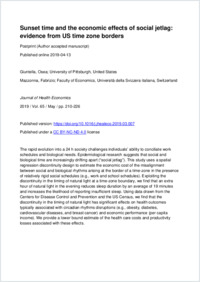Sunset time and the economic effects of social jetlag: evidence from US time zone borders
- Giuntella, Osea University of Pittsburgh, United States
- Mazzonna, Fabrizio Facoltà di scienze economiche, Università della Svizzera italiana, Svizzera
-
13.04.2019
Published in:
- Journal of Health Economics. - 2019, vol. 65, no. May, p. 210-226
English
The rapid evolution into a 24 h society challenges individuals’ ability to conciliate work schedules and biological needs. Epidemiological research suggests that social and biological time are increasingly drifting apart (“social jetlag”). This study uses a spatial regression discontinuity design to estimate the economic cost of the misalignment between social and biological rhythms arising at the border of a time-zone in the presence of relatively rigid social schedules (e.g., work and school schedules). Exploiting the discontinuity in the timing of natural light at a time-zone boundary, we find that an extra hour of natural light in the evening reduces sleep duration by an average of 19 minutes and increases the likelihood of reporting insufficient sleep. Using data drawn from the Centers for Disease Control and Prevention and the US Census, we find that the discontinuity in the timing of natural light has significant effects on health outcomes typically associated with circadian rhythms disruptions (e.g., obesity, diabetes, cardiovascular diseases, and breast cancer) and economic performance (per capita income). We provide a lower bound estimate of the health care costs and productivity losses associated with these effects.
- Language
-
- English
- Classification
- Economics
- License
-
License undefined
- Open access status
- green
- Identifiers
-
- RERO DOC 324549
- DOI 10.1016/j.jhealeco.2019.03.007
- ARK ark:/12658/srd1318994
- Persistent URL
- https://n2t.net/ark:/12658/srd1318994
Statistics
Document views: 278
File downloads:
- Postprint: 1139
